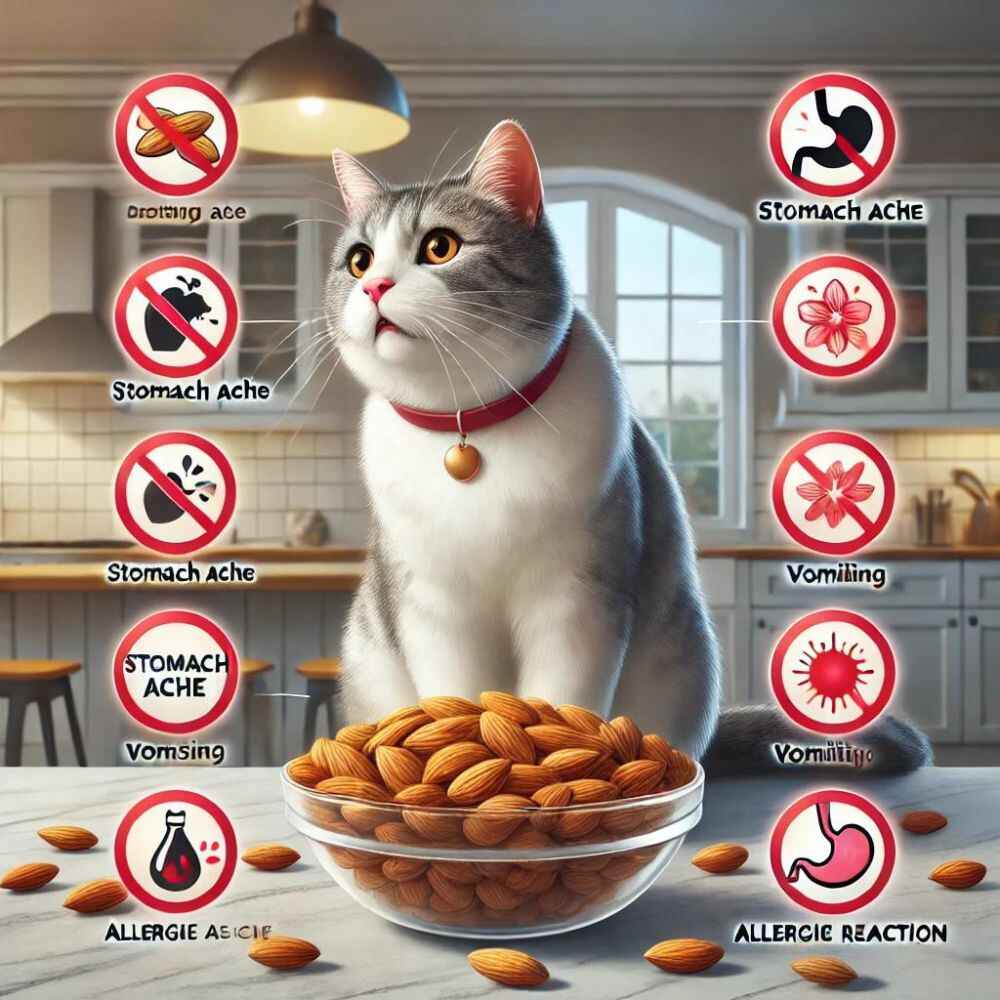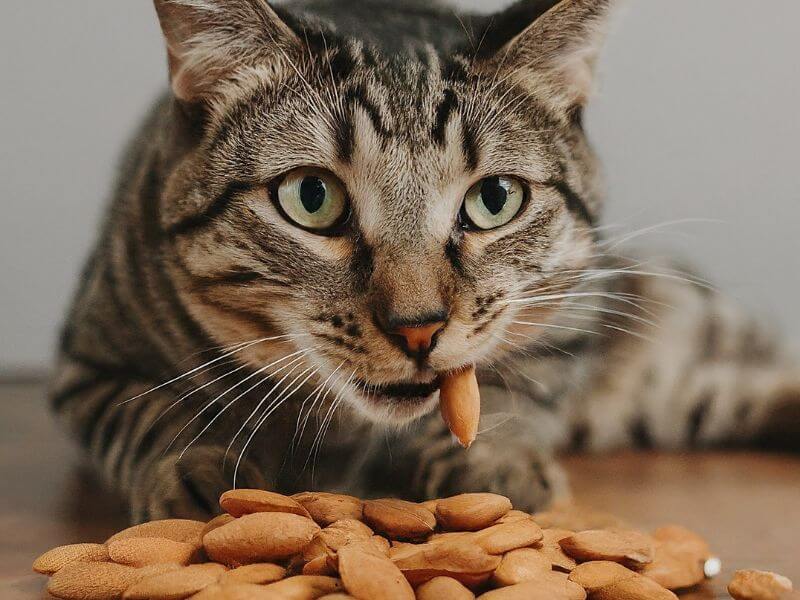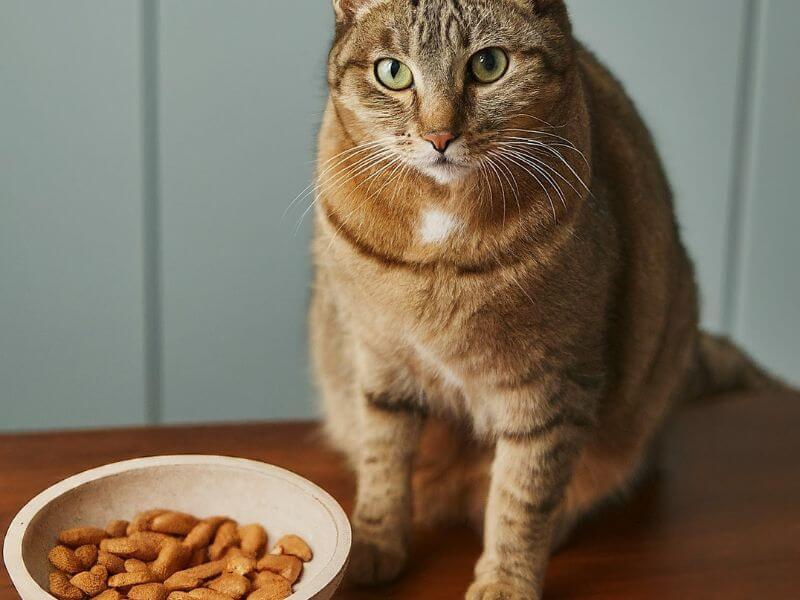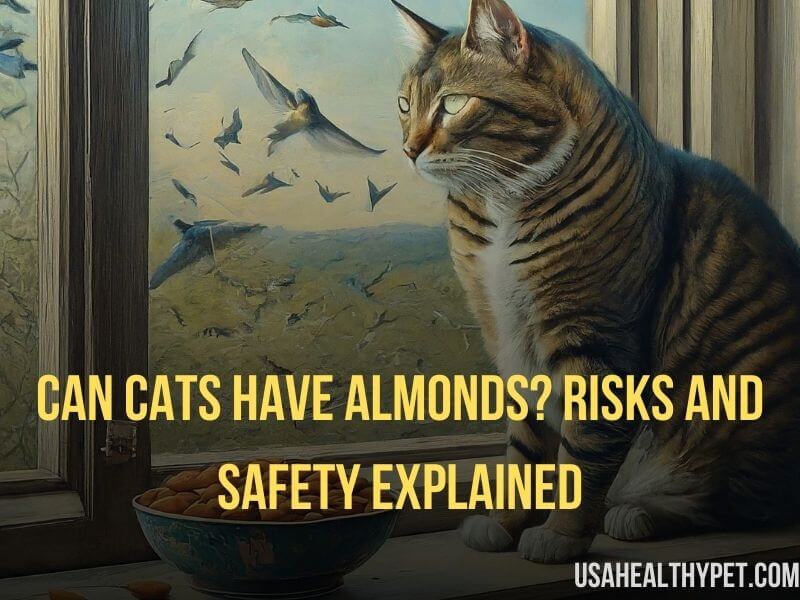You’re sitting on the couch enjoying a handful of almonds, and before you know it, your curious cat is eyeing the snack in your hand.
If you’re like most cat owners, you’ve probably wondered, Can cats have almonds? It’s a fair question—after all, we love sharing treats with our pets. But when it comes to almonds, things get a bit tricky.
Are Almonds Safe for Cats?
Let’s get straight to the point: No, almonds are not safe for cats. While almonds aren’t considered highly toxic like chocolate or onions, they can still pose several health risks to your feline friend.
Cats have very different digestive systems than humans. They are obligate carnivores, meaning their bodies are built to digest meat, not plant-based foods like almonds.
Even though a tiny piece of almond might not send your cat to the vet immediately, regular consumption can cause significant issues. So, it’s better to keep those nuts far away from your kitty.
Why Do Cats Like Almonds?
If cats are carnivores, why would they even be interested in almonds? Well, like humans, cats can be curious creatures! They might be drawn to the crunchiness or the smell of the almonds, especially if they’re flavored or roasted.
Also, cats love to play with things they can bat around with their paws, and almonds are just the right size for a game of “catch the nut.”
However, just because your cat shows interest doesn’t mean almonds are a good idea for them to eat.
The Nutritional Value of Almonds: For Humans or Cats?
Almonds are packed with nutrients like healthy fats, fiber, protein, and vitamin E, making them a popular snack for humans. But for cats? Not so much.
Cats don’t need the fiber or plant-based fats found in almonds. They thrive on animal proteins and fats, which is why your cat’s diet should consist primarily of high-quality cat food that meets their specific nutritional needs.
Almonds simply don’t offer anything beneficial to your cat’s health.

Potential Risks of Almonds for Cats
While almonds might seem harmless, there are a few potential risks involved if your cat decides to snack on them:
- Choking Hazard: Almonds can easily become lodged in a cat’s throat, causing them to choke.
- Digestive Issues: Cats aren’t equipped to break down the compounds in almonds, which could lead to upset stomachs, vomiting, or diarrhea.
- High Fat Content: The fat in almonds can lead to pancreatitis, a serious inflammation of the pancreas, especially if consumed in large amounts.
Clearly, these little nuts aren’t as harmless as they seem when it comes to your feline friend.
Almond Poisoning in Cats: Is It a Real Threat?
Although almonds themselves aren’t classified as highly toxic for cats, some experts warn against bitter almonds, which contain cyanogenic glycosides.
These substances can break down into cyanide, a highly toxic compound. Thankfully, bitter almonds aren’t commonly sold in stores, but it’s still something to be aware of.
Sweet almonds, the type you’d typically find at the store, may not contain cyanide, but that doesn’t make them safe for cats. Even without the risk of poisoning, almonds still pose enough other risks to warrant caution.
Signs of Almond Toxicity in Cats
How can you tell if your cat has eaten almonds and is suffering from a reaction? Some signs of almond toxicity include:
- Vomiting
- Diarrhea
- Lethargy
- Loss of appetite
- Labored breathing
If you notice any of these symptoms after your cat has had almonds, you should contact your veterinarian right away.

Can Cats Eat Almond Milk?
Now, what about almond milk? It’s dairy-free and plant-based, so it seems like a harmless alternative, right? Not quite.
Although almond milk is less risky than whole almonds, it still doesn’t offer any nutritional value for cats.
Some almond milk products also contain added sugars and artificial flavors that could upset your cat’s stomach or contribute to obesity.
If you want to offer your cat a treat, it’s best to stick to options specifically designed for them.
Are Flavored or Roasted Almonds Dangerous?
Flavored almonds, especially those that are roasted and salted, can be even more dangerous for cats. Salt can lead to sodium ion poisoning, while added seasonings like garlic or onion powder are toxic to cats.
Roasting the almonds may also make them more difficult to digest, further increasing the risk of digestive problems.
In short, flavored or roasted almonds are a definite no-no for your kitty.
How Many Almonds Are Too Many?
Even a small number of almonds can cause problems for a cat, depending on their size and digestive system. One or two almonds might not immediately lead to severe health issues, but why risk it?
If your cat sneaks a single almond, they’re likely to be okay, but if they eat a handful, that’s when you should start worrying.

What to Do If Your Cat Eats Almonds
If you catch your cat in the act of eating almonds, don’t panic. First, remove any remaining almonds from their reach. Keep an eye on your cat for any symptoms of discomfort or illness.
If they vomit, have diarrhea, or show signs of lethargy, it’s time to give your vet a call.
As with any non-cat food ingestion, it’s always better to be safe than sorry.
Healthy Alternatives to Almonds for Cats
Looking for a safer snack for your cat? Try these cat-friendly alternatives:
- Cooked chicken or turkey
- Plain, unseasoned fish
- Commercially available cat treats
- Small pieces of cheese (in moderation)
These options will not only satisfy your cat’s curiosity but also ensure they get the nutrients they need.
Preventing Almond Mishaps: Tips for Pet Owners
To prevent your cat from eating almonds or other harmful foods, make sure to:
- Store Almonds Safely: Keep almonds and other snacks in sealed containers out of your cat’s reach.
- Don’t Share Snacks: Resist the urge to share your snacks, no matter how much your cat begs.
- Monitor Playtime: Ensure your cat isn’t playing with small objects like almonds that could become choking hazards.
When to Call the Vet
If you notice any symptoms of almond toxicity, or if your cat eats more than one or two almonds, it’s best to contact your vet immediately.
They can provide advice on whether you should bring your cat in for treatment or monitor them at home.
Conclusion: Keep Almonds Out of Your Cat’s Diet
So, can cats have almonds? The answer is a firm no. While they might not be deadly, almonds can cause choking, digestive issues, and in some cases, toxicity.
It’s always best to err on the side of caution and keep human snacks like almonds far away from your furry friend.
If you’re ever in doubt, consult with your vet. And remember, when it comes to your cat’s diet, it’s better to stick to foods specifically made for them. After all, you want your feline friend to live a happy, healthy life!
FAQs
- Can almonds kill cats? While almonds aren’t usually fatal to cats, they can cause serious health problems, including choking and digestive upset. In rare cases, they may lead to more severe reactions.
- What should I do if my cat eats an almond? If your cat eats an almond, monitor them closely for any signs of illness. If they show symptoms like vomiting or lethargy, call your vet right away.
- Are almonds toxic to cats? Almonds aren’t classified as highly toxic, but bitter almonds can contain cyanogenic glycosides, which are harmful. It’s best to keep all almonds away from cats.
- Is almond butter safe for cats? Like almonds, almond butter is not recommended for cats. It contains high levels of fat, which can lead to pancreatitis and other health issues.
- Can cats have other types of nuts? Most nuts, including walnuts, macadamia nuts, and pecans, should be avoided due to their high-fat content and potential toxicity. Always stick to cat-friendly treats!

Pingback: Can Cats Eat Cotton Candy? Risks, and Safe Alternatives
Pingback: Can Cats Eat Pizza Rolls? Dangers and Safe Alternatives